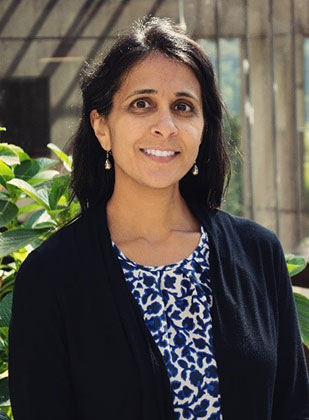April 02, 2021

Anjum Hajat, Ph.D. investigates the intersection of air pollution and psychosocial stressors, and how they affect health outcomes. Her research suggests that individuals who suffer from stressors, such as poverty and neighborhood disadvantage, in conjunction with air pollution exposure, have more adverse health outcomes, such as cardiovascular disease.
Applying her social-epidemiological background, Hajat is researching whether air pollution shares the same biological pathways, such as those involved in the body’s response to stress, that psychosocial stressors do.
Hajat, a faculty affiliate and Career Development Awardee at the NIEHS-funded University of Washington Center for Exposures, Diseases, Genomics, and Environment (EDGE), became interested in this topic when she was examining stress hormone (cortisol) levels in community members exposed to air pollution and facing psychosocial stressors. Hajat and her team collected daily saliva samples from the participant to measure their cortisol. This approach allowed the research team to spot any irregularities of cortisol using various statistical methods.
“When I started air pollution research, I realized that air pollution researchers were talking about some of the same biological systems as stress researchers. It made me wonder whether both psychosocial stressors and air pollution are impacting the body through similar biological systems. That led me to write a couple of different papers to see if air pollution is associated with both cortisol and with other stress hormones.”
Hajat views her research as one of the first steps in learning how to reduce health disparities in communities with high air pollution and psychosocial stressors. Furthermore, she sees her work intersecting environmental justice and epidemiology. Her goal, when she first approached this topic, was to understand and assist in alleviating environmental disparities that often affect low-income communities and communities of color. Her involvement with the center helped Hajat connect with other scientists and enabled her to develop meaningful relationships with community-based organizations.
With these new partnerships, she hopes to conduct a community-engaged study highlighting community voices to demonstrate how their environment impacts them, which Hajat believes is integral for a thorough and accurate project.
“If we're not engaging the communities who are really impacted by environmental health disparities, then I don't think we're going to come up with the right answers,” said Hajat. “If researchers sit in their offices and try to come up with solutions, it's definitely not going to be as effective as if we're engaging community voices because they know what their problems are, and they know how to solve them.”
Hajat’s research describes how psychosocial and environmental stress exposures across the life course effect the development of cardiovascular disease has been recently published in the journals Environmental Health Perspectives, Environment International, and the International Journal of Environmental Research and Public Health.


